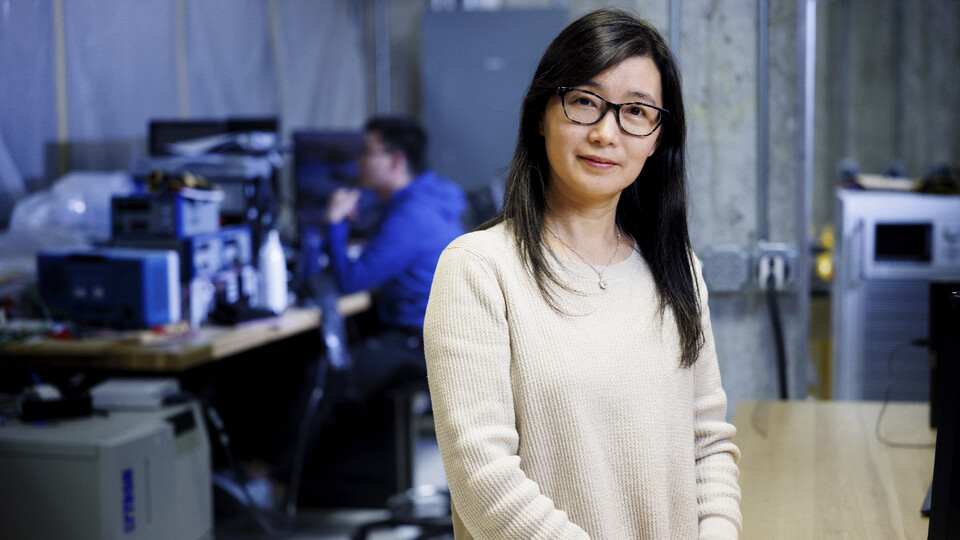February 27, 2024 | View original publication
Qu named senior member of National Academy of Inventors
University of Nebraska–Lincoln engineer Liyan Qu has been elected a senior member of the National Academy of Inventors.
The academy’s senior member program recognizes early-stage innovators whose success in patents, licensing and commercialization is positively impacting the welfare of society and economic development in their communities. Senior members are rising leaders in their fields who foster innovation and mentor the next generation of inventors. Each member holds a U.S. patent that has been licensed or commercialized, and/or five or more issued U.S. patents.
Qu, associate professor of electrical and computer engineering, is the first Husker woman to receive the recognition and fifth UNL researcher overall, joining a group of approximately 550 senior members worldwide. She is a named inventor on nine issued U.S. patents.
Qu is an expert in developing magnetoelectric devices that facilitate improved electrical energy conversion; advanced motor and generator control methods; and technology breakthroughs in renewable energy systems. Broadly, her work supports the country’s movement toward electrification and cleaner energy sources by providing software and hardware solutions that increase the efficiency, flexibility and reliability of the electricity supply.
Her technologies also help integrate renewable energy sources, such as solar and wind power stations, into existing power grid systems.
“The main goal of my work is to provide cleaner electrical energy to customers with high efficiency, high reliability and at a lower cost,” Qu said. “In addition, if we improve efficiency, that means we can reduce energy-related emissions, which benefits the environment.”
Qu is a pioneer in developing a novel magnetoelectric transformer that is equipped to handle the variable voltage levels in the power grid system. Transformers are integral components of the power grid, playing a role in the generation, delivery and consumption of electricity.
Transitioning to green energy sources will require advanced transformers capable of flexibly regulating voltage fluctuations in the electric supply. Qu has led the way in developing these next-generation devices, using a new composite magnetoelectric material that layers magnetostrictive materials with piezoelectric materials. This composite material enables the transformer to continuously control voltage levels and can be used to develop new electric power converters capable of controlling both voltage level and frequency of the electricity. This translates to flexible, reliable and lower-cost conversion of electric energy as it moves from the generation side to the customer side.
“Traditional transformers can only change the voltage levels stepwise, not continuously, and only allow for control of the voltage level, not the frequency of the electricity,” Qu said.
Qu’s work in this area has been supported by a National Science Foundation Faculty Early Career Development Program award and a Department of Energy Advanced Research Projects Agency-Energy grant.
Qu has also led the way in developing control methods that allow machines and power grids to operate with greater efficiency and reliability. By advancing approaches that allow for sensorless control, high-performance direct torque control and intelligent adaptive control, she has paved the way for motors and generators that are smaller, lighter, less expensive and less mechanically complex than current state-of-the-art options. Her work in this area could have applicability in any industry where motors are prevalent, including agriculture, transportation and construction.
Additionally, Qu has pioneered innovations that incorporate renewable energy sources into the existing power grid. Her work addresses one of the biggest disconnects between the two: The output from solar panels and some wind generators is direct-current, or DC, electricity. Existing power grids utilize alternating-current, or AC, electricity. The two must be in sync to unlock the full potential of green energy sources.
Toward this end, she has developed methods and devices that convert DC to AC power at a higher efficiency and lower cost than current methods. Her technologies are also capable of monitoring the condition of the energy sources, allowing operators to gauge the devices’ overall health and stay on top of possible failures. This surveillance ability will lead to lower maintenance costs, less downtime and fewer power outages.
With DOE funding, Qu developed an innovative power electronic converter called the Hot-Swappable, Fault-Tolerant, Modular Power Converter system. Designed to help solar power plants connect to the power grid, the system is a modular circuit made of building blocks that are swappable. This means that if one or multiple units fail, they can be removed and replaced without disconnecting the entire system or compromising function, leading to a roughly 50-60% reduction of failure-caused downtime and energy loss.
Qu has authored nearly 140 peer-reviewed publications, received numerous research awards from the College of Engineering, and supervised seven doctoral students and five postdoctoral researchers. Her students have accepted tenure-track academic positions and industry jobs at companies that include BorgWarner, Ford, Amazon and Innovusion.
Qu will be inducted as a senior member on June 17 at the 13th NAI Annual Conference in Raleigh, North Carolina.






